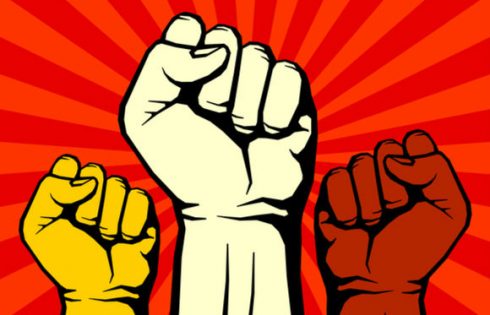
Does anyone really think a series of ‘vignettes’ will make the world a better place?
San Diego State University’s residential administration is putting on a weird and silly program for its students, one which, as The College Fix reported yesterday, subjects participants to a “a ‘disturbing’ series of ‘sensory experiences’ in an attempt to drive out students’ prejudicial tendencies and help make them less oppressive.” In this workshop, attendees are presented with a series of skits that depict, variously: a government raid on an apparent illegal immigrant; neo-Nazis juxtaposed with Third Reich Nazis; a white woman confessing that she doesn’t “feel comfortable sharing a room” with a Middle Easterner; and numerous other scenarios that more or less depict the world as progressives tend to see it.
The program “strives to give people a way to experience oppression in a hands-on way. By engaging emotions of the participants, it allows for the accounts in the program to be truly effective.” One is skeptical that a low-budget student production that reiterates stale liberal talking points could really be all that “effective,” but maybe we’re missing something.
Here is a genuine question: does anyone—the administrators that approved this program, the people who produced it, or the students who attended it—actually believe that it does anything in the way of education? I am not sure. Indeed this question could be extended to the hundreds upon hundreds of similar efforts at hundreds of campuses across the country. It is common today for students to put on skits, plays, presentations and demonstrations in order to “raise awareness” of this or that ballyhoo. Most of these efforts seem genuine and heartfelt. Yet as educational tools they seem to be more or less useless and utterly forgettable. Put another way: do the people in charge of such exhibitions go away thinking, “Yeah, we totally changed some minds today!” Or is it more likely that they are aware of how minuscule an effect their efforts really have?
I do not mean to be cruel: one does not want to mock and deride people who are sincerely trying to change the world, in however small a way. But there are ways to do it that are effective—the annual March for Life, for instance, or the immensely successful nonviolent protests of the Civil Rights era—and then there are ways to do it that are just embarrassing time sucks. Activists should learn to tell the difference between practical activism and immaterial performance art; it will save everyone a lot of time and energy if people focused on the former at the expense of the latter.
MORE: Harvard Women’s Center to roll out ‘Gender 101’ training courses
IMAGE: PathDoc / Shutterstock.com
Like The College Fix on Facebook / Follow us on Twitter






Please join the conversation about our stories on Facebook, Twitter, Instagram, Reddit, MeWe, Rumble, Gab, Minds and Gettr.